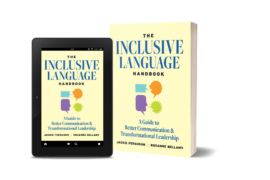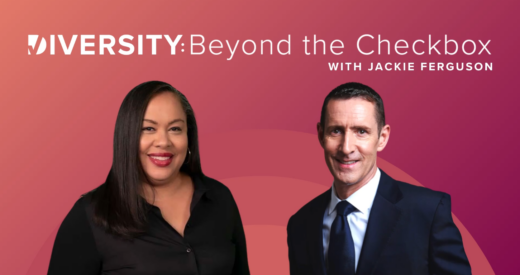One of the biggest mistakes an inclusive leader can make is to interpret the actions of another person through their own cultural lens. Yet, we as humans, do this all the time. Take the simple act of smiling, which can be interpreted as friendly, odd, or even dishonest; it just depends on the local culture. Cultural mismatches of all sorts can make communication difficult and get in the way of effective team collaboration, even if your team isn’t global or geographically dispersed.
Culturally intelligent leaders get the most out of their diverse teams, because they recognize that everyone has a different perspective and their own way of communicating. They also welcome new ideas and see each interaction as a learning opportunity. By respecting everyone’s unique worldview, inclusive leaders can cultivate welcoming workplaces where people feel valued, included, and encouraged to contribute their best work. The resulting sense of belonging has many benefits, including a more collaborative workplace and a healthier focus on employee wellbeing.
Productive collaboration and next-level innovation are impossible without cultural intelligence, which enables inclusive leaders to build understanding and synergy within diverse groups. Any business that strives to remain relevant, agile, and competitive — no matter where it operates — will optimize its efforts by cultivating an inclusive workplace culture and leaders who are masters of cultural intelligence.
Why Effective Leaders Need Cultural Intelligence

In today’s global business environment, inclusive leaders are expected to work harmoniously with colleagues and associates from many different cultures and backgrounds – yet this is not a skill most managers learn in school or even on-the-job. Cultural intelligence equips executive teams with the tools to bridge cultural gaps; build strong, cohesive teams; and effectively navigate the complexities of a worldwide business landscape. By asking thoughtful questions, doing research, and maintaining an open mind, inclusive leaders can form meaningful relationships with colleagues and associates – no matter where they are from.
Allegro MicroSystems, headquartered in Manchester, New Hampshire, is a global semiconductor leader in sensor and power integrated circuits and photonics. The technology company has design and applications centers located across the Americas, Europe, and Asia, and a manufacturing facility in the Philippines. Julie Rousseau, Director of People Management at Allegro, says something as straightforward as taking time to learn about another culture can strengthen a geographically dispersed team.
“Allegro is globally dispersed in several countries, and cultural awareness can be a challenge,” Rousseau says. “Respecting others and being patient are two really important qualities. Empathy plays a big part; listening skills are very important. DEI really comes down to treating people like human beings, treating people with respect, but understanding that not every human is like me.”
By responding to the human elements of business, culturally intelligent executives can more easily navigate the complex dynamics of diverse teams with empathy and sensitivity. These leaders are better equipped to cultivate belonging, empathy, and inclusion across their employee base. Inclusive leadership capabilities naturally align with diversity, equity, and inclusion (DEI) best practices, which enable leaders to tap into diverse viewpoints and amplify the talents of a diverse workforce.
Culturally intelligent leaders are more innovative and effective

Cultural intelligence has many benefits in the workplace, helping managers and employees develop stronger relationships, communicate more effectively, and coordinate better with colleagues and customers. It can also enhance engagement with team members, clients and customers, and increase productivity and performance. In short, cultural intelligence helps leaders and organizations win in the marketplace.
In the early 2000s, I had a marketing and sales consulting company, and one of my clients was John Deere, which manufactures agricultural and lawn care machinery. At the time, there was a huge influx of Spanish-speaking people settling in the community, and many of these new residents were launching landscaping companies. I helped the company craft a cross-cultural marketing campaign, so it could market more effectively to this growing entrepreneurial population.
That experience highlighted an opportunity for me to help other companies connect with diverse populations. The company I founded, The National Organization for Diversity in Sales and Marketing, focused on helping U.S. companies recognize the purchasing power of diverse populations and craft inclusive marketing strategies, free of stereotypes.
One of my clients was a travel company that refused to let same-sex couples come to their resorts. I asked the leadership team: “Do you know how much purchasing power and disposable income the LGBTQ+ community has?” Because the issue was framed as a business decision, the owners of the company were able to put their personal opinions aside and create a more welcoming environment at their properties.
Cultural intelligence is characterized by a willingness to form mutually beneficial relationships with individuals from a variety of backgrounds. My ability to engage with individuals who don’t share my identity, perspective, or worldview has allowed me to navigate complex business relationships and provide value.
5 Practical Strategies for Enhancing Cultural Intelligence
Leaders with strong cultural intelligence know that just because someone else approaches a challenge differently, doesn’t mean their tactics are better or worse. They also know how to recognize cultural differences, celebrate them, and address them where necessary to create a strong team environment. That’s not to say that cultivating cultural intelligence doesn’t take effort. Even the most inclusive leader understands that being open to new opportunities and learning moments can help them be better leaders and collaborators. Here are some practical strategies to improve your cultural intelligence:
- Explore Underrepresented Voices and Diverse Perspectives: To expand your cultural intelligence, seek out voices and perspectives that you may not usually hear or consider. Read books, listen to podcasts, watch documentaries, and engage with resources that shed light on communities different from your own.
- Uncover your Unconscious Bias: There are several ways that unconscious bias can forestall your curiosity about other cultures, therefore it’s important to be aware of any assumptions you are making about people from different cultures. Humans naturally attribute qualities – both good and bad – to certain groups. However, when you know your biases, you can mitigate them by approaching every individual with curiosity and respect for their unique lived experience.
- Foster Connections: Building relationships with people from diverse backgrounds is a powerful way to enhance cultural intelligence. Challenge yourself to connect with at least one new person every week. You will gain fresh perspectives, business leads, potential hires, and valuable learning opportunities through these connections.
- Notice Body Language: Pay close attention to the nonverbal cues in your interactions. Body language can be universal in some aspects but can also vary significantly across cultures. Be flexible and adapt to the body language of those around you, mirroring their comfort levels.
- Ask Clarifying Questions: Don’t hesitate to ask questions when you are unsure about cultural norms. Observe and respectfully seek clarity. Questions like, “What is the usual tone of this meeting?” or “I noticed that… Can you tell me more about…” are excellent ways to bridge gaps in understanding. Don’t assume that you are being understood or achieving your aims, just because you aren’t receiving feedback. Different cultures have varied social etiquettes when it comes to offering criticism or constructive feedback.
By applying these practices and embracing the principles of cultural intelligence, senior business leaders can create a workplace where diversity is celebrated, unity is fostered, and innovation flourishes. Making the commitment to a culture of inclusion and understanding enables you to pave the way toward success in an increasingly diverse and interconnected world.
Join the ranks of forward-thinking organizations that are harnessing the power of inclusive leadership to build stronger executive and managerial teams. Contact us today to learn how TDM LeaderView can transform your team and allow your organization to thrive.
Shelley Willingham, CDE, is Chief Revenue Officer at The Diversity Movement. She is an entrepreneur, business strategist, and marketer who uses an equity lens to help clients achieve better business outcomes. Connect with her on Linkedin.




